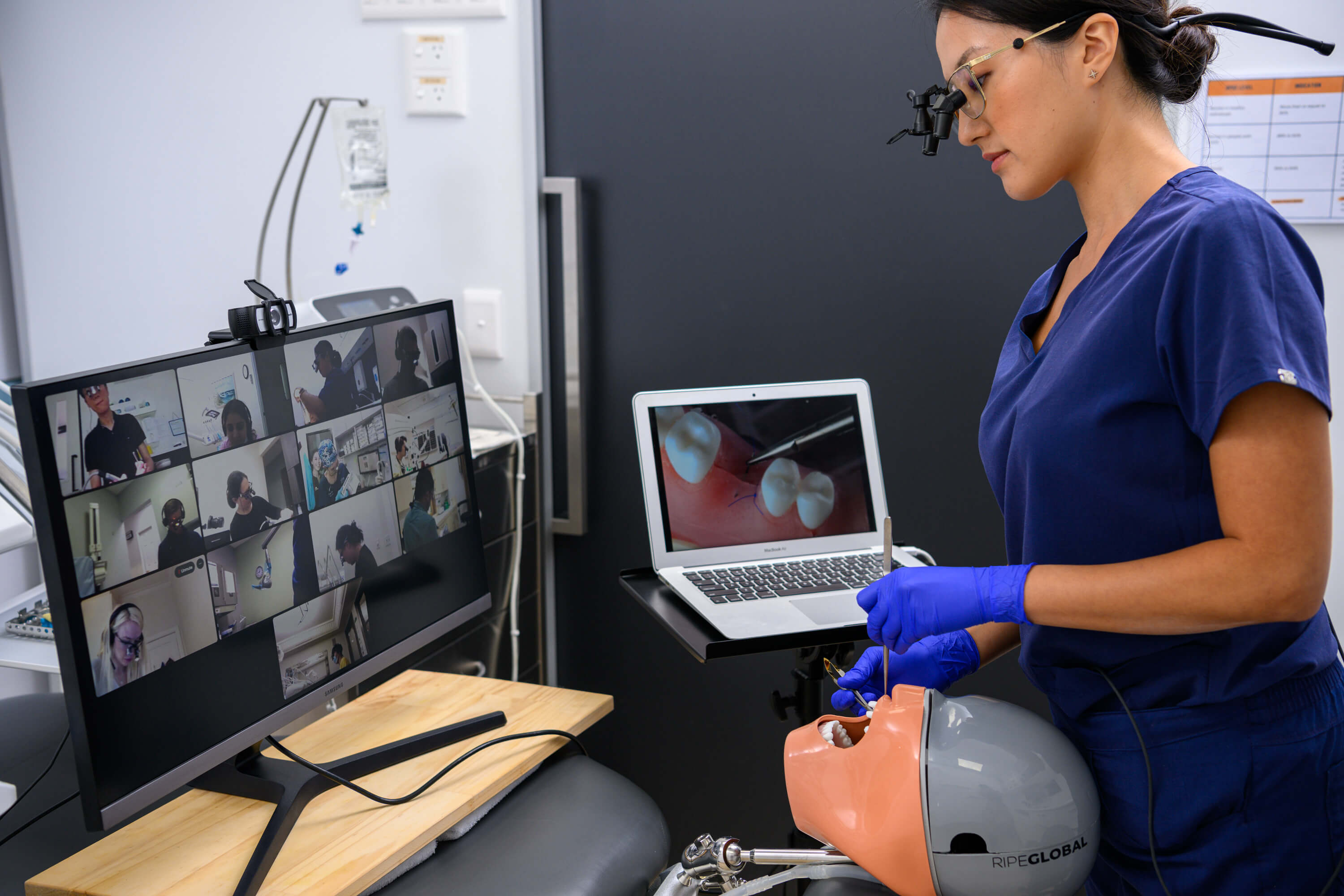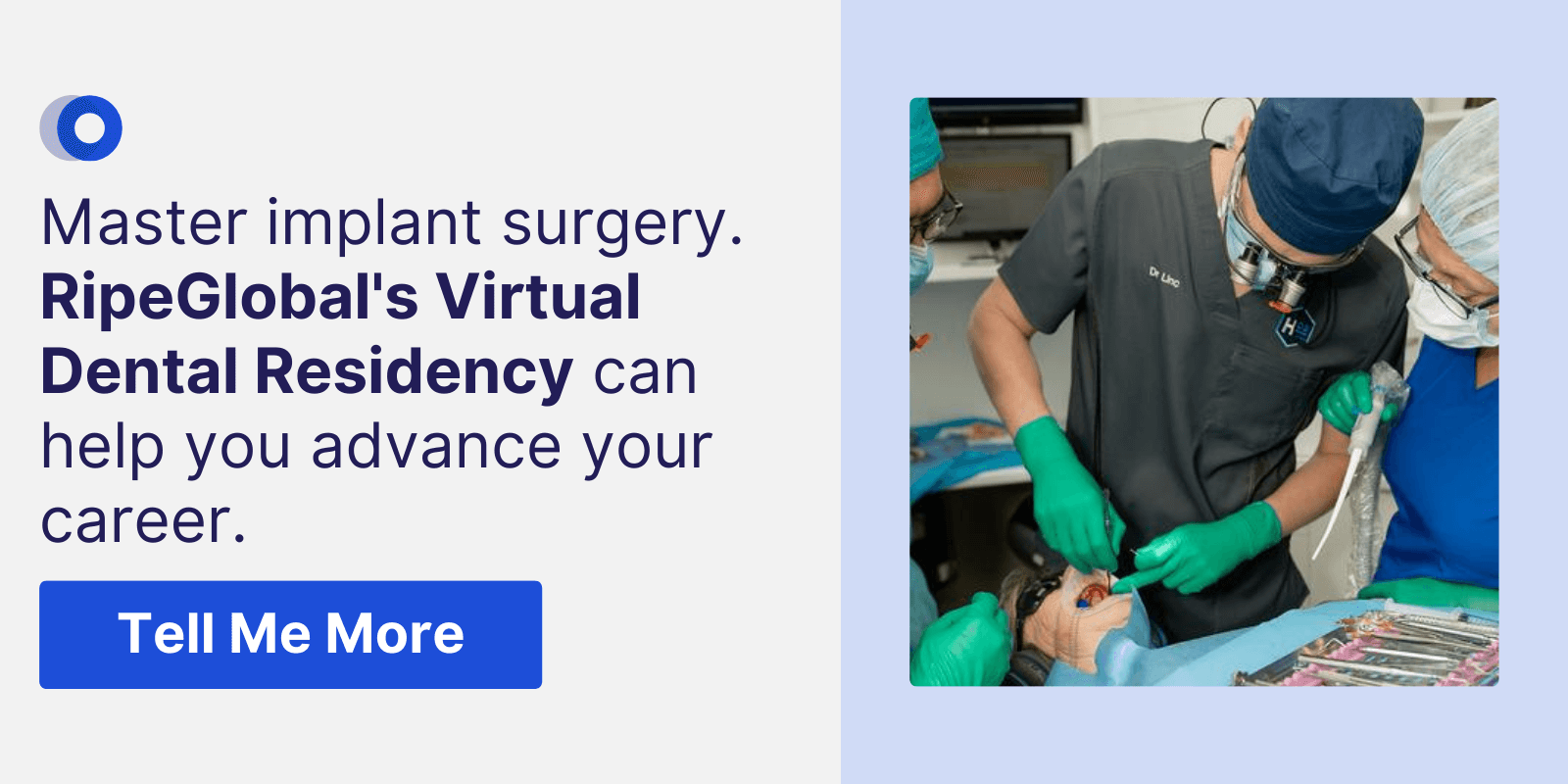Modern Dental Implantology 101
Dental implants do more than restore a smile, they can allow your patient to eat, chew, and speak confidently. Implantology offers an alternative to dentures or other options that wouldn’t work as well for the patient’s mouth and specific needs.
Dental implants are posts that attach to the patient’s jaw for stability — however, this is a surgical procedure that requires skill and experience to perform reliably.
So how do you gain the confidence and know-how to offer implants at your practice? Having an understanding of implantology procedures and their challenges can prepare you for taking the next step toward advanced periodontics and implantology mastery.
Dental Implant Procedures & Techniques
The ability to create and carry out a dental implant treatment plan comes with years of experience and knowledge. In some cases, dentists who are not experts in the field will involve other practitioners in specific steps such as the actual surgery or the prosthetic phase. If you can master several techniques, you’ll be one step closer to providing the best implant and restorative dentistry experiences for your patients.
.png)
Dental Implant Procedures
Most dental implant procedures are outpatient surgeries done in stages. Although some digital dentistry techniques can be used to help speed up the process, your patient will still need time to heal between steps in the process. Key dental implant procedures include:
- Soft tissue augmentation.
- Lateral window and crestal sinus lifts.
- Implant placement.
- Anterior and posterior immediates.
- Bone grafts.
- Full arch cases.
- All on X.
Advanced periodontics and implantology techniques and procedures may be required for multiple missing or damaged teeth or if the patient had other complications that would make a traditional implant procedure less effective.
Advanced Periodontics and Implantology Challenges and Techniques
Challenge 1: Soft Tissue Grafts
Healthy gums at the site of the implant provide stability and function for long-term success. However, many patients have soft tissue loss that would not serve as a good foundation for the implant. In these cases, soft tissue grafts may be needed to improve the aesthetics and function of the gums and implants.
Technique To Master: Soft Tissue Graft Types
To provide necessary implants for any patient, you should master the following types of grafts:
- Free gingival graft.
- Tunneling with connective tissue graft.
- Coronally advanced flap with connective tissue graft.
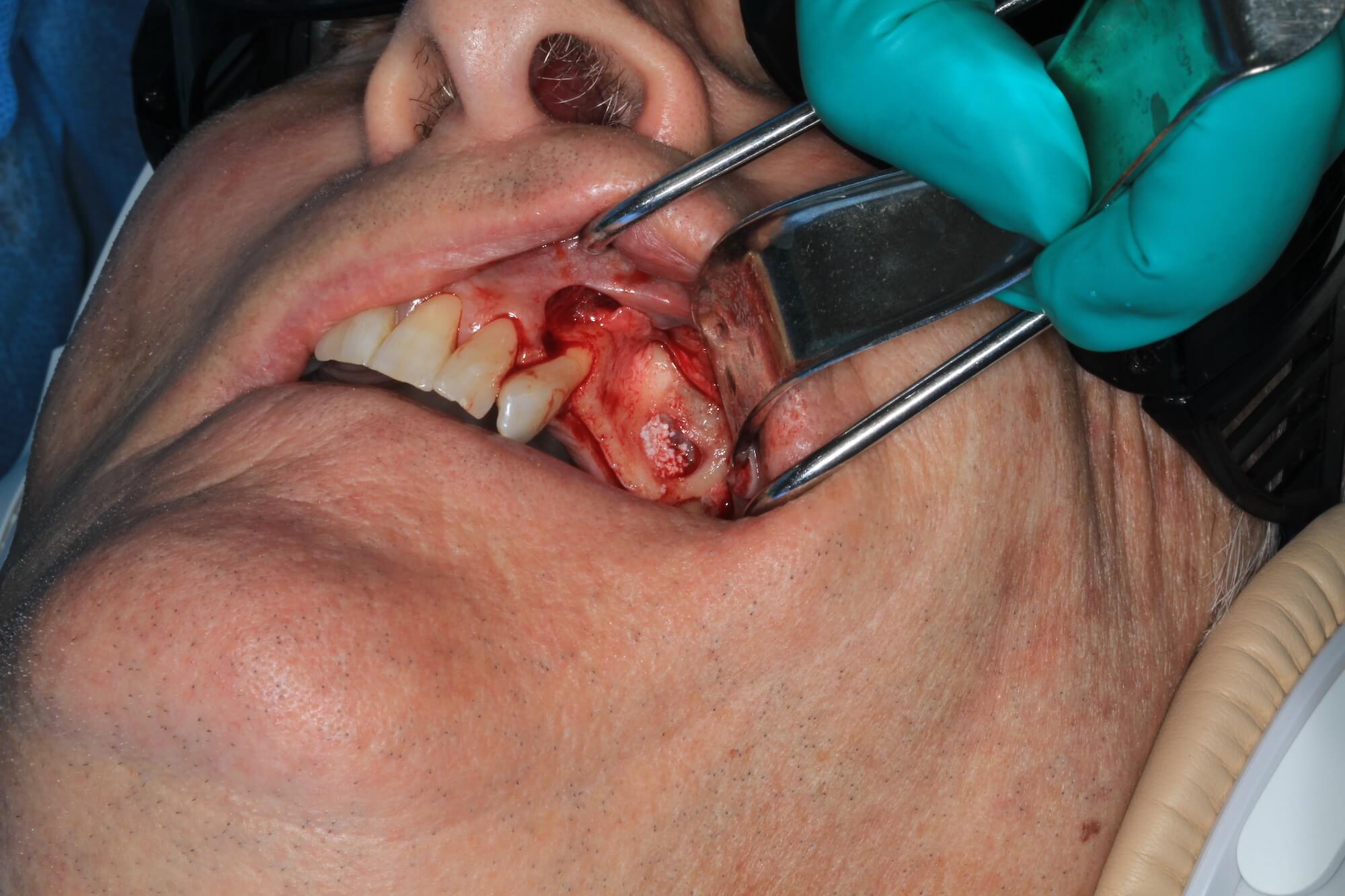
Challenge 2: Sinus Lifts
Also known as sinus augmentation, a sinus lift is a procedure that adds bone between the molars and premolars to support dental implants. This procedure is often necessary when the patient has bone loss in the upper jaw. Many sinus lift procedures need an experienced hand for them to be worthwhile for the patient.
Technique To Master: Sinus Lift Types
Depending on the condition of the bone and the future placement of the implant, you may need to perform an internal/crestal sinus lift or a lateral sinus lift. The placement of the bone graft should be precise to promote proper healing.
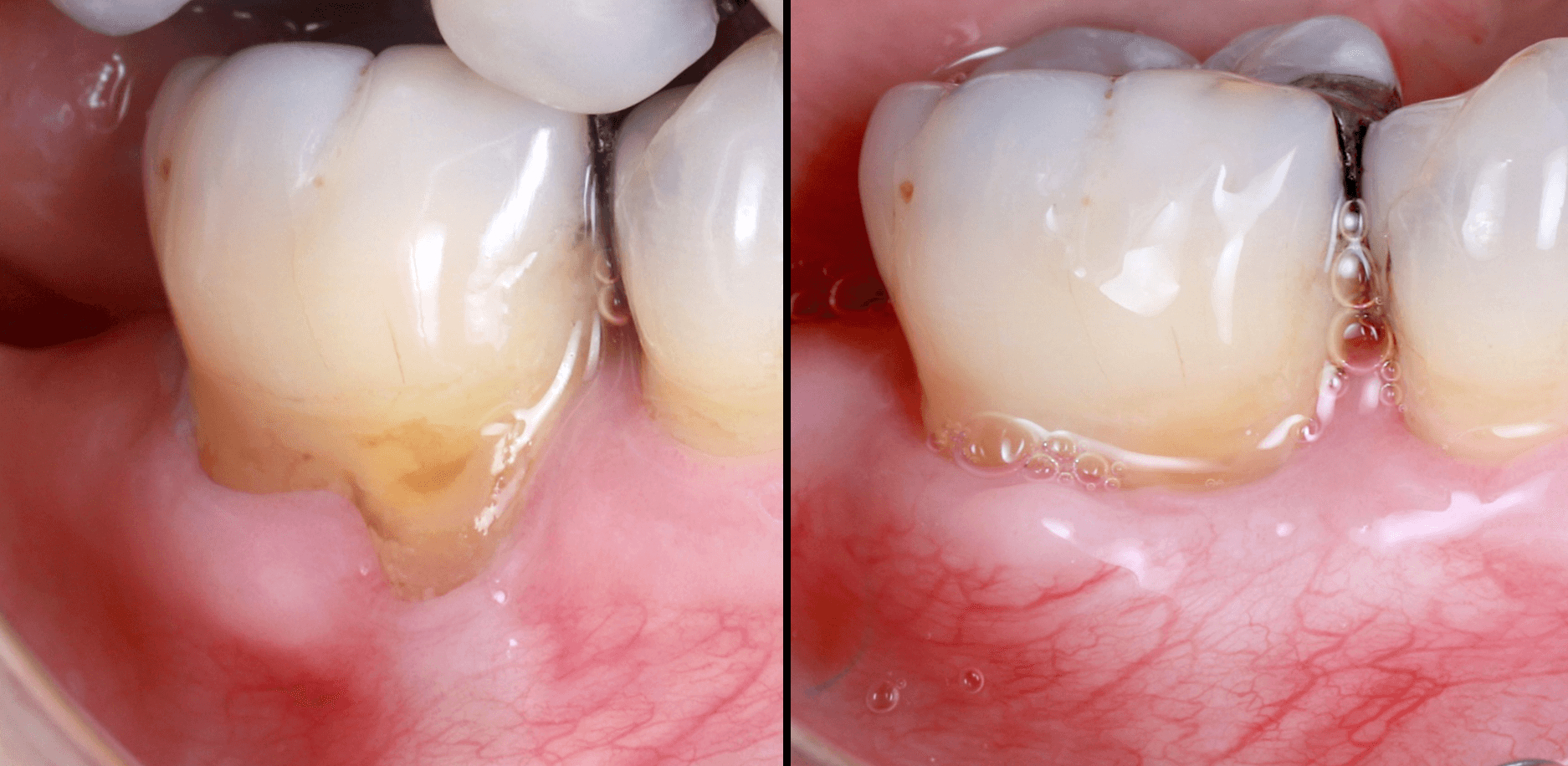
Challenge 3: Implant Placement
Implant placement and restoration techniques can determine the durability of the implant. More importantly, an improperly placed implant or poor loading could result in patient discomfort or a failed procedure that could require a new treatment plan to correct the problem.
Technique To Master: Timing of Implant Placement and Loading
Delayed, early, or immediate implant placement with or without delayed or immediate loading should be determined on a case-by-case basis. Knowing how to identify what is best for the patient comes with creating a successful treatment plan so that you can confidently perform the procedure that your patient expects.
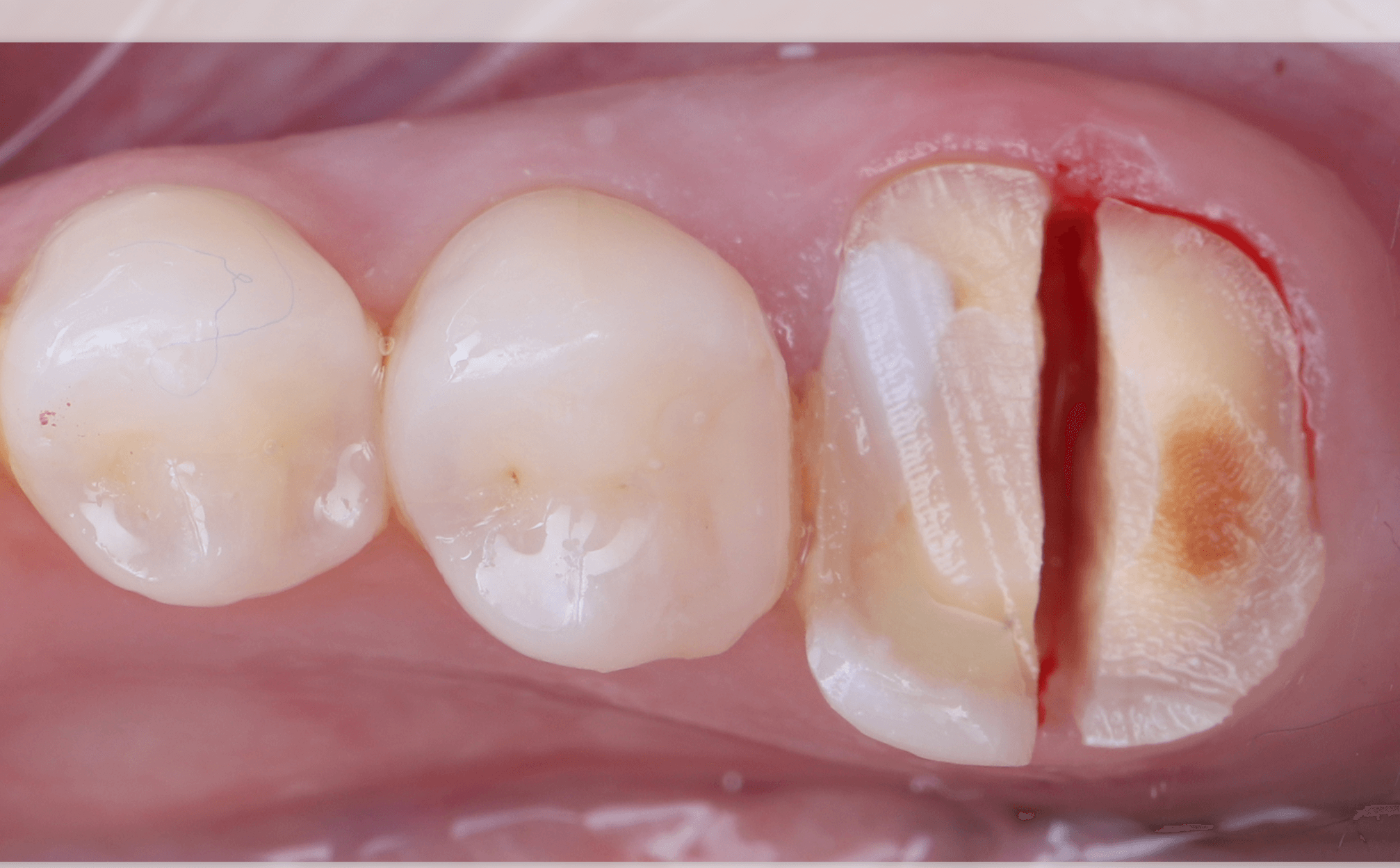
Adding Dental Implants to Your Skill Set
Adding Dental Implantology to your skill set has several benefits. Once you’ve determined if this is the right call for your dental career, you’ll want to look at dental continuing education options that will teach you techniques and provide you with valuable information that you can immediately put into practice.
.png)
Benefits of Adding Implant Procedures to Your Practice
Aside from the added confidence and feeling of accomplishment, adding dental implant procedures to your practice offers the following benefits to you:
-
Increased patient pool — attracts more patients.
-
Increased revenue potential — can offer more procedures in-house.
-
Increased reputation — can become well known in the field through word of mouth and reviews.
Your patients will also appreciate the availability of dental implant procedures. Some patient benefits include:
-
More ways to improve the look, feel, and function of their teeth.
-
Convenience of care if they are already your patient — no need to get a referral.
-
Reduced anxiety through having an experienced dentist and solid treatment plans.
Knowledge Needed for Dental Implant Mastery
Before you can add Implantology to your skill set, it’s imperative to know the standard treatment plan process, what steps are needed for different procedures, healing time frames, and more. You’ll also need to know how to tackle the challenges of advanced dental implantology such as multiple implants in one mouth and creating a treatment plan that works for your patient.
CEREC CE courses can teach you how to effectively use the Chairside Economical Restoration of Esthetic Ceramic (CEREC) machine to fabricate dental implants and reduce the number of office visits your patient needs to complete the treatment.
A full arch dental implant course can help you learn the techniques and best practices for handling these complex procedures. Additional advanced periodontics and implantology courses can help you learn the best course of action for different circumstances.
You can improve your ability to establish a working relationship with your patients during implant procedures through treatment planning courses. These courses can help you help your patients understand the procedures and their options for improved oral health.
Technical Skills Needed for Dental Implant Mastery
Having the theory down is necessary for adding dental implants to your “can-do” list — but you must also have the technical skills mastered to perform implant procedures reliably. The skills for successful implant procedures include:
-
Advanced surgery skills — dexterity, suturing, etc.
-
Soft tissue grafts.
-
Extraction.
-
Implant placement.
-
Restorative dentistry for pre-work.
How To Add Dental Implantology at Your Practice
Some dental education courses can give you both the knowledge and the practice to master dental implantology. Taking these courses can help you avoid malpractice lawsuits or making promises to your patients you can’t keep.
CE CPD credits
CE dental courses and CPD courses allow you to grow as a dentist while meeting any continuing education requirements. There are several dental implant courses out there that are eligible for CE credit. When choosing which Implantology courses can best support your goal of mastery, remember to do your homework on the course service provider to make sure they have the best options available for you.
Traditional Schooling
Traditional schooling for your continuing education in dental implantology includes in-person courses and seminars. These in-person options used to be the easiest way to earn your CE credits and add to your dentistry skill set. While this still may be a viable option, here are some considerations:
Consider cost and travel requirements. What is the cost of each course you wish to take? If this is a seminar, are there travel requirements? Do the fees include practice equipment or 1:1 time with the instructor? Aside from these questions, you’ll also need to consider if you can take the time away from your practice or home life.
Consider what courses are offered. The courses should not only meet your CE credit needs but also can help you grow as a dentist by covering the topics you wish to learn about the most. It’s a good idea to do some research on who will be teaching the course or speaking at the seminar so you can be sure you’re learning from an experienced professional.
Consider hands-on learning availability. Many in-person courses and seminars are lecture-style. They may have limited opportunities for you to practice the skills reviewed.
Online Options
Online dental implant education providers can provide flexibility that is often lacking with in-person courses — especially post-pandemic. Additionally, most online courses will be more budget-friendly and you’ll be able to learn from the comfort of your own home or office.
However, you’ll still want to be discerning in your search for online dental education, as not all dental education companies offer CE credit eligibility, a wide variety of courses, or hands-on simulated learning. Besides these considerations, you should look for an online learning platform that comes with a supportive community of like-minded dental professionals. Surrounding yourself with motivated dental professionals can help keep you focused on your goals, provide opportunities for collaboration, and give you the support you need along the way.
RipeGlobal is a leading online dental education provider focused on making dental education more accessible and collaborative worldwide. With hands-on simulation training, world-class dental educators, a supportive community, and a variety of dental CE courses available, you’ll never feel alone on your Implantology mastery journey.
All-On-X Course
The All-On-X Course by RipeGlobal is a dental implant course that teaches more than just placing the implant. With an All-On-X strategy, you’ll be able to provide your patient with the best dental implant treatment options available. This is a one-off course that can help you to add dental implant procedures to your skill set.
Virtual Dental Residency
Although individual courses can get you off on the right foot, you may be looking for a deep-dive option that can boost your confidence and your career. A Virtual Dental Residency in Implantology offers:
-
Two years of online learning taught by a master dentist.
-
20% hands-on simulated learning.
-
A curriculum designed to let you take what you learn and apply to your practice.
-
Access to on-demand learning resources.
-
A RipeGlobal Sim Kit delivered to your home for endless applied learning.
-
Continuing Education credit eligibility.
Take Hold of Your Dental Education With RipeGlobal
Everyone needs help at one point or another in their career. That’s why RipeGlobal is here to bring together dentists from around the world and learn in a cooperative environment that fosters skill development for predictable, reliable dental procedure mastery.
Discover your potential to add dental implants to your skill set — learn more about RipeGlobal’s Virtual Dental Residency in Implantology.

